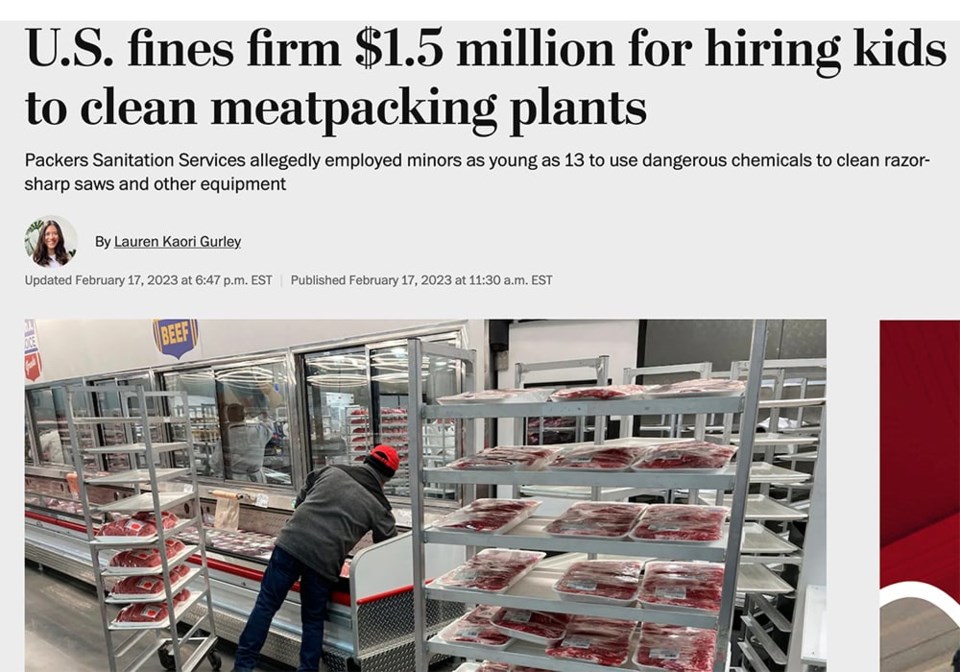WESTERN PRODUCER — A much-favoured line often quoted by preachers and politicians rightly notes that “the true measure of any society can be found in how it treats its most vulnerable members.”
Curiously, a famous American politician, former vice-president Hubert Humphrey, and an even more famous attorney-turned-preacher, Mahatma Gandhi, are both credited as its originator.
It’s doubtful, however, that any of the “Big Meat” corporations ponder its authorship, let alone its admonition.
The latest evidence to highlight Big Meat’s low light is a mid-February case where, according to the Washington Post, a company named Packers Sanitation Services Inc. (PSSI) paid a US$1.5 million fine after it “allegedly employed minors as young as 13 to use caustic chemicals to clean ‘razor-sharp saws,’ head splitters and other dangerous equipment at meat-packing facilities in eight states … in some cases for years.”
Take a moment to consider the full meaning of those words: 13-year-olds, caustic chemicals, razor-sharp saws, and something called “head splitters.”
The topper in this woeful tale is that some of the processing plants using PSSI-hired contract cleaners “are operated by some of the country’s most powerful meat and poultry producers, including JBS Foods, Tyson and Cargill. Those companies were not charged or fined,” reported the Post Feb. 17.
It’s not that these Big Three (of meat packing’s Big Four) aren’t profitable enough to have their own cleaning crews of trained professionals who are old enough to drive or at least shave once a week.
We know this because, in 2022, for example, Tyson Foods’ net profits totalled $3.3 billion on sales of $53.3 billion. The world’s biggest meat packer, JBS, posted results for 2021 (its latest) that showed $20.5 billion net profit on $351 billion in sales. Privately held Cargill doesn’t reveal profits but reported $165 billion in total sales for 2022.
Remember, none of these immensely profitable, global meat packers were “charged or fined” by the U.S. Department of Labor in this case because none of the cleaners were employed by JBS, Tyson or Cargill.
Instead, all worked for PSSI, a Wisconsin company that is “privately owned by Blackstone, one of the world’s largest private equity firms, and employs roughly 17,000 workers,” explained the Post.
Simply put, that means three of ag’s biggest, richest players are at least two steps removed from legal liability for “accidents” or injuries that occur while workers, some as young as 13, are cleaning and sanitizing their industrial slaughterhouses.
PSSI provides other benefits, too, according to its website. For example, the “vision” of company founders more than 50 years ago included PSSI “providing contract sanitation services using a non-unionized workforce.”
The website doesn’t say if that founding vision also included child labour.
Still, it may get a helping hand in that endeavour because at least two midwestern states heavy with meat-packing presence, Iowa and Minnesota, are considering laws that allow “exceptions to child labour regulations in their respective states due to the persisting labour shortage,” reported Business Insider Feb. 13.
Of the two legislative proposals, Iowa’s is particularly “abhorrent,” related a Feb. 12 Cedar Rapids Gazette editorial. The legislation “pushes for teenagers as young as 14 years old to work in… jobs like mining, meat-packing and logging… work longer shifts that last late into the evening… (and) what’s more… the company they worked for would be free from any civil liability or negligence.”
If that proposal becomes law, warned the former Successful Farming writer Cheryl Tevis in a Feb. 18 Substack post, all Iowans “would be complicit, along with our elected representatives and governor, if we look the other way… (while) putting our children in harm’s way.”
Exactly, but we continue to “look the other way;” we continue to give power to the already too powerful until, like now, all we have left to give is our most vulnerable, our children.
Shame on them and shame on us.
Alan Guebert is an agricultural commentator from Illinois.

